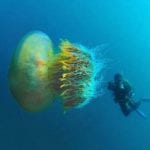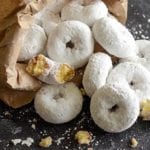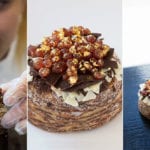 Weird Stuff
Weird Stuff  Weird Stuff
Weird Stuff  Weird Stuff
Weird Stuff The 10 Unluckiest Days from Around the World
 Food
Food 10 Modern Delicacies That Started as Poverty Rations
 Movies and TV
Movies and TV 10 Shared TV Universes You’ve Likely Forgotten About
 Weird Stuff
Weird Stuff 10 of History’s Greatest Pranks & Hoaxes
 Miscellaneous
Miscellaneous 10 LEGO Facts That Will Toy with Your Mind
 Misconceptions
Misconceptions 10 Widespread Historical Myths and the Texts That Started Them
 Crime
Crime 10 Incredible Big-Time Art Fraudsters
 Movies and TV
Movies and TV 10 Most Influential Fictional Objects in Cinema History
 Our World
Our World Top 10 Real Almost‑Cities That Never Materialized
 Weird Stuff
Weird Stuff Ten Bizarre Visions of 2026 from Fiction
 Weird Stuff
Weird Stuff The 10 Unluckiest Days from Around the World
 Food
Food 10 Modern Delicacies That Started as Poverty Rations
Who's Behind Listverse?

Jamie Frater
Head Editor
Jamie founded Listverse due to an insatiable desire to share fascinating, obscure, and bizarre facts. He has been a guest speaker on numerous national radio and television stations and is a five time published author.
More About Us Movies and TV
Movies and TV 10 Shared TV Universes You’ve Likely Forgotten About
 Weird Stuff
Weird Stuff 10 of History’s Greatest Pranks & Hoaxes
 Miscellaneous
Miscellaneous 10 LEGO Facts That Will Toy with Your Mind
 Misconceptions
Misconceptions 10 Widespread Historical Myths and the Texts That Started Them
 Crime
Crime 10 Incredible Big-Time Art Fraudsters
 Movies and TV
Movies and TV 10 Most Influential Fictional Objects in Cinema History
 Our World
Our World Top 10 Real Almost‑Cities That Never Materialized
Top 10 Wacky Things New Zealanders Love To Eat
[COMPETITION: This list had a competition which is now closed. See the featured comment for the names of the prize winners.]
The term “Kiwiana” is used to describe certain items that represent New Zealand’s history and cultural heritage. They are either particularly unique to the country, or have been adopted to such an extent that they are now considered to be cultural icons. Here are some examples of food and drink that represent the nation of New Zealand and its sometimes delightfully kitschy quirkiness.
Top 20 Cool Facts About New Zealand
[Note from JFrater: as the owner of Listverse and a Kiwi myself, I couldn’t pass up the chance to publish a list that includes so many of the things I love to eat and drink! So consider this my vanity pick for the year!]
10 Pavlova
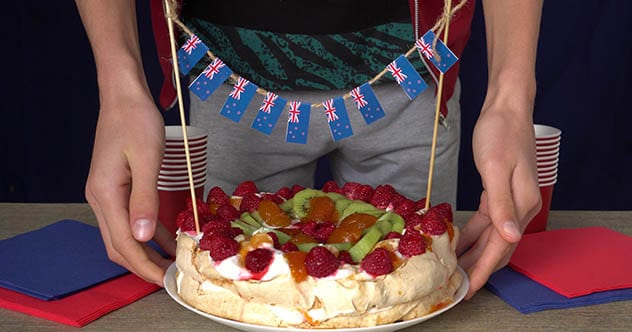
A pavlova or “pav” as it’s often called, is a dessert resembling an over-sized meringue. It is commonly thought to have been named after the famous Russian ballerina Anna Pavlova, who toured New Zealand in the 1920s. The dessert has a crisp and crunchy crust, but unlike a meringue, it is light, soft and marshmellow-like on the inside. It is usually topped with whipped cream and fresh fruit, most commonly kiwifruit and strawberries.
(Side note – the fuzzy skinned green fruit is called “kiwifruit” in New Zealand in order to avoid any unnecessary confusion with the small, flightless and endangered kiwi bird.)
Made from stiffly beaten egg whites, superfine sugar, vinegar, vanilla extract and cornstarch, pavlova is most commonly served at Christmastime, although it is available year round. It has also been the source of almost a century of contentious debate as to whether the recipe first originated in New Zealand or Australia. The answer is, of course, New Zealand. Here is the most classic recipe from the Edmond’s Cookbook, a much loved book that most kiwi homes have and most teenagers are gifted when they move out and go “flatting”.[1]
9 Cheese Rolls
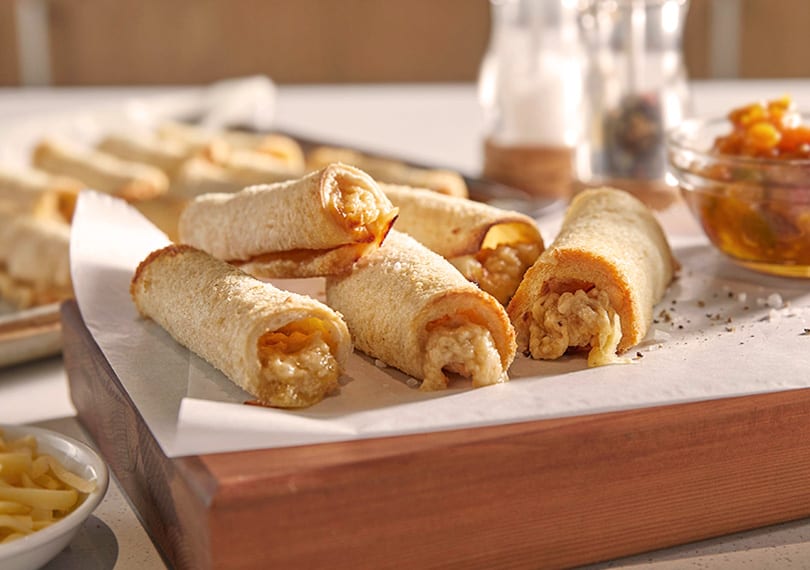
At its most basic level, a cheese roll simply consists of a buttered slice of white bread that is topped with cheese, rolled up and lightly grilled. Additional ingredients might include evaporated milk, sweetcorn, pineapple or finely chopped onion, while optional seasonings might be Worcestershire sauce, mustard powder, or onion soup powder.
Cheese rolls are one of the few New Zealand dishes that are more specific to one island. They are far more popular in the South Island, especially in the “Deep South” at the bottom of the country, where they can be jokingly referred to as “Southern Sushi”.
The earliest known recipes date from the 1930’s, although in the south of the country family recipes for the humble Cheese Roll can be closely guarded secrets, handed down from generation to generation.
Crispy and crunchy on the outside, soft and gooey on the inside, a cheese roll is the perfect accompaniment to a bowl of soup on a cold day.[2]
8 Lolly Cake
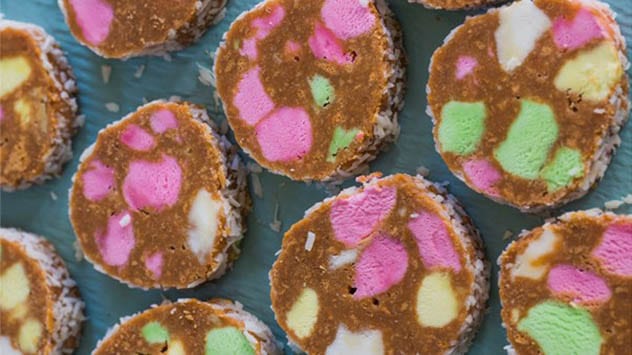
Lolly cake is a fudge-like unbaked slice, with a much-loved kiwi lolly featuring in the mixture. Eskimo candies (or fruit puffs at a pinch) are pastel colored, soft and sweet, resembling firm marshmallows. They get their name from the fact that they are shaped like smiling Eskimos (much to the horror of visiting Canadians!) Eskimos also feature in the delicious kiwi ice cream treat called an Eskimo Pie.
Quick and relatively easy to make, Lolly Cake consists of crushed plain malt biscuits (cookies) combined with the chopped up candy, melted butter and sweetened condensed milk. When combined, the mixture in shaped into a log, then rolled in coconut. Once chilled, it is cut into slices. Here’s the best recipe for it.
It is a favorite with children and adults alike. One slice is not enough. Neither is two. Nor three. You get the picture.[3]
7 Whitebait Fritters
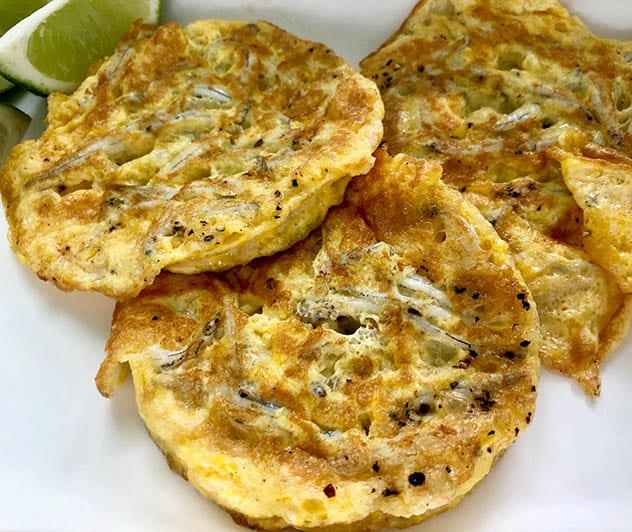
Whitebait is a term used to describe small juvenile fish from the family Galaxiidae that often swim together in large schools. They are considered to be a real delicacy in New Zealand and are eaten whole, including the skin, heads, bones and innards.
The most common way to eat whitebait in New Zealand is in a whitebait fritter, essentially a light omelette mixture used to hold the tender little fish together. The preferred mixture is for an egg white omelette, with a light seasoning of salt and white pepper, as whitebait have a very subtle flavor that can easily be overpowered by other ingredients. Here is the full recipe.
The fritters are often served between buttered slices of soft fresh white bread, accompanied with lemon wedges.
Unfortunately habitat loss and over-fishing have meant that four out of the five types of whitebait to be found In New Zealand are considered to be either endangered or under serious threat of extinction. Conservation groups such as the Forest and Bird Society have called for a ban on all commercial sales of whitebait until stocks recover.[4]
6 Paua
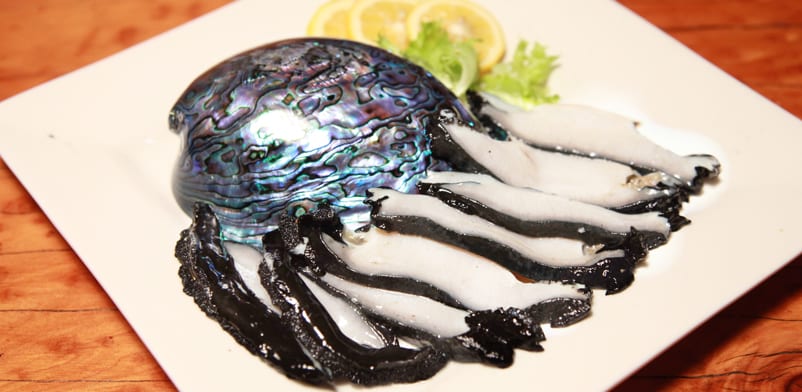
Paua (pronounced pa-wa) is the name given by the Maori to a large marine snail-like gastropod. Elsewhere it can be more commonly referred to as abalone, although paua is a variety that is unique to New Zealand. While paua is perhaps most well known for its brightly colored iridescent shell used in jewelry and souvenirs, the large black muscular foot of the shellfish is also considered to be a real delicacy.
New Zealand paua has quite a strong flavor which some people say is more like a steak than a shellfish. Like calamari, it is also very tough and rubbery if not cooked correctly, so it is best served minced or finely sliced and cooked into a fritter. Here’s how you do that.
5 Hokey Pokey Ice Cream
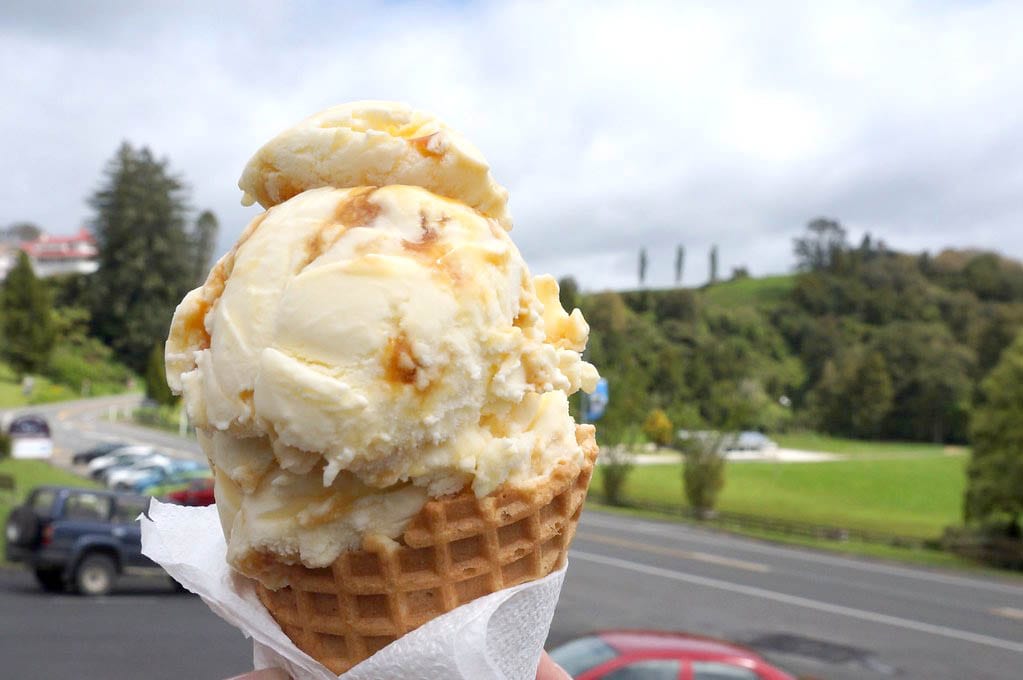
Hokey pokey ice-cream does not involve putting your left foot in, and your right foot out, then shaking it all about! In New Zealand, hokey pokey is a crunchy honeycomb type of toffee. The Tip-Top ice-cream company devised a way to make small hard balls of hokey pokey and mixed it into plain vanilla ice cream. In doing so, they created one of their most popular flavors and a cultural icon.
New Zealanders are the world’s second-largest consumers of ice-cream per capita, consuming on average a whopping 26 litres of ice-cream per person per year.[5]
4 Afghan Biscuits
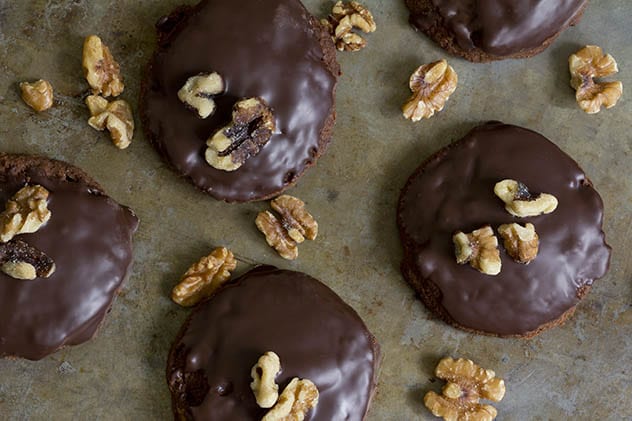
An afghan biscuit is a cookie made with powdered cocoa, plain flour, sugar, butter and cornflake cereal. They are topped with chocolate icing and half a walnut.
The biscuits are soft and crumbly, rich and dense, due in part to the relatively low sugar content. This also makes them perhaps a little bitter tasting from the volume of cocoa powder, but this is off-set by the sweetness of the icing. Here’s an excellent recipe for afghans.
3 Marmite
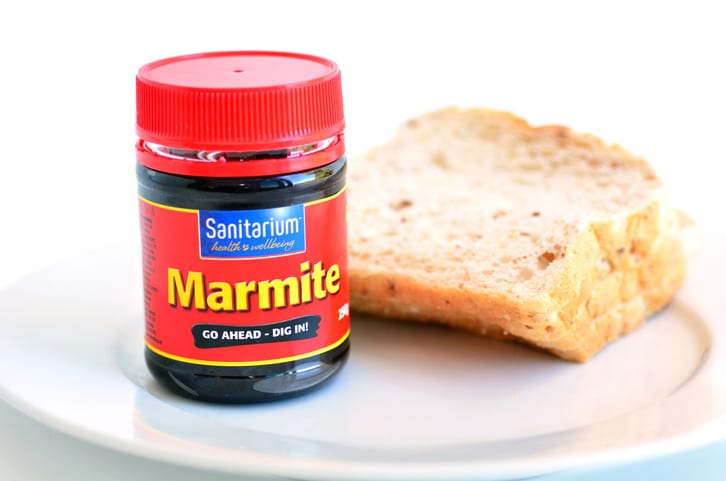
Marmite is a concentrated yeast extract, which is a by-product of beer production. Marmite has been produced in New Zealand since 1919 by the Sanitarium food company and due to ownership of the trademarked name, English marmite (the original) is not allowed to be sold in New Zealand under that name. Very similar to (though significantly nicer than) its Australian Vegemite counterpart, New Zealand Marmite has a strong, sweet, salty and somewhat tangy taste. It is a “love it or hate it” type food.
It is most commonly used as a spread on toast or crackers, or in Marmite and cheese sandwiches.
When the Christchurch factory which produced Marmite was deemed unsafe and closed following a devastating earthquake in November 2011, the resulting Marmite shortages created panic buying and price-gouging on online auction sites. This crisis became known as “Marmageddon”. Ex-pat kiwis always keep a jar on hand.[6]
2 Feijoas
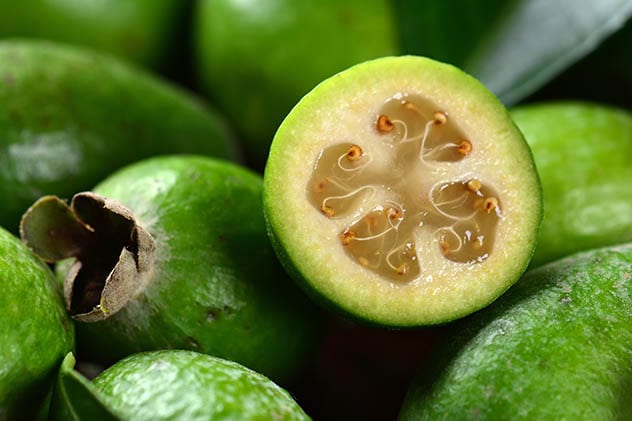
The feijoa or pineapple guava is a small fruiting tree from the myrtle family. The green fruit, which is about the size of a chicken egg, is sweet and aromatic. The taste is somewhat complex and difficult to describe, with some calling it a combination of pineapple and mint, while others have described it was being almost like soap!
The flesh is opaque and jelly-like in the centre of the fruit, yet closer to the skin it is somewhat pear-like in that it is gritty and granular.
While it is a warm-subtropical plant, it is also frost tolerant and it grows very well throughout New Zealand. While feijoas can be used in baking or preserves, they are usually eaten raw by cutting in half and scooping the flesh out with a spoon. The gritty texture can make for an interesting addition to fruit smoothies.[7]
1 Pineapple Lumps
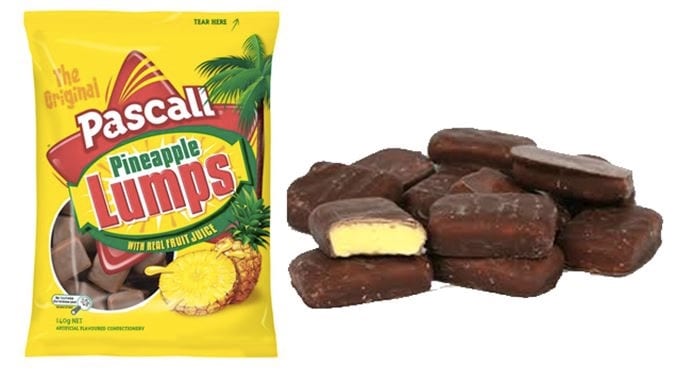
Pineapple Lumps are a rectangular soft and chewy pineapple flavored candy, coated in chocolate. First produced in the 1950s in the southern town of Oamaru, there was public outcry when the Cadbury company closed its factory in Dunedin in 2018, resulting in Pineapple Lumps having to be imported from Australia.
Changes to the recipe had Pineapple Lump connoisseurs complaining that the Aussie-made candies had a weak pineapple flavor and overly gooey or sometimes gritty texture. This saw the last remaining packets of the Kiwi-made Pineapple Lump candies become highly sought after and reach astronomical prices on on-line auction websites. Nevertheless, for most of us, they remain a treasured snack even if they are made across the ditch.[8]
+ L&P
L&P or Lemon and Paeroa is a popular sweet soft drink. As the name implies, it was first manufactured in the small North Island town of Paeroa, with sweetened lemon juice and carbonated mineral water. Originally produced in 1907, the brand is now sadly owned by global giant Coca-Cola.
L&P’s tongue-in-cheek marketing slogan “World famous in New Zealand” is now a part of the New Zealand lexicon. It is also a popular mixer with Southern Comfort whiskey.[9]
++ Competition
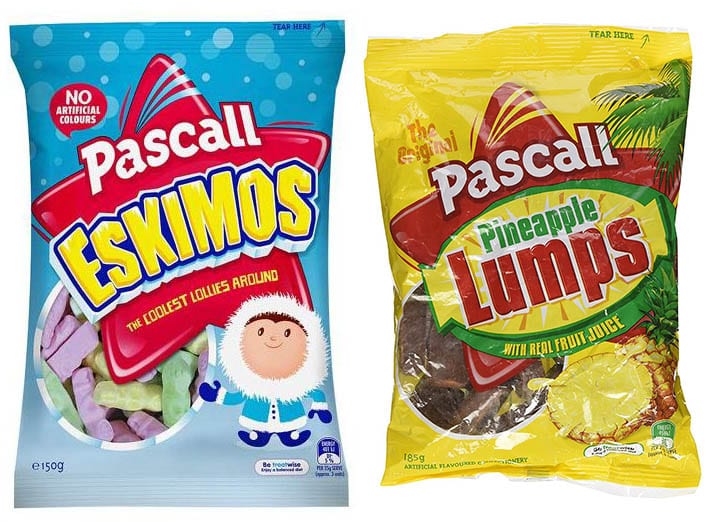
At midnight Pacific Standard Time tonight (twenty-four hours from now), ten commenters will be selected at random to win a bag of both the yummy candies listed here: Eskimos, and Pineapple lumps. The competition is open to all contributors from all countries. To be clear, each winner will receive two bags of candy . . . and maybe a little extra treat!. Comments must be related to the list and not be clearly aimed at simply winning (such as repeating the same comment over and over).
THE WINNERS ARE: batlady Missmv Maria mac.attack Wyrmwood13 TriumphofDeath Jonathan H. Kantor TheStoneOfSisyphus Jean Shepard howard38 Chelseagirl74.
Hooray for you all! Please send an email to [email protected] with your username here, your real name, your delivery address (no PO Boxes), and your telephone number for the courier!
For more lists like this, check out 15 Interesting Places and Events in New Zealand, and 10 Ways The Maori Made Life Hell For The New Zealand Colonials, eh!
